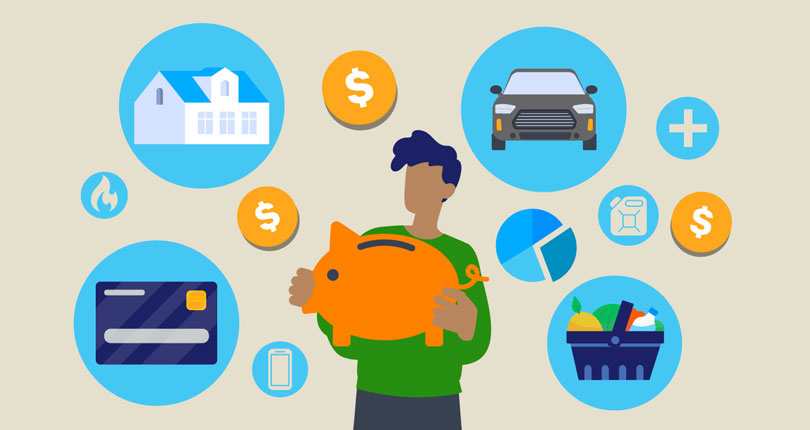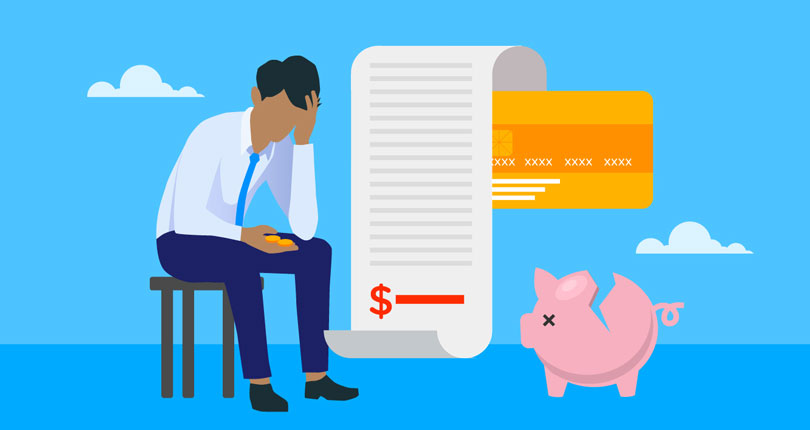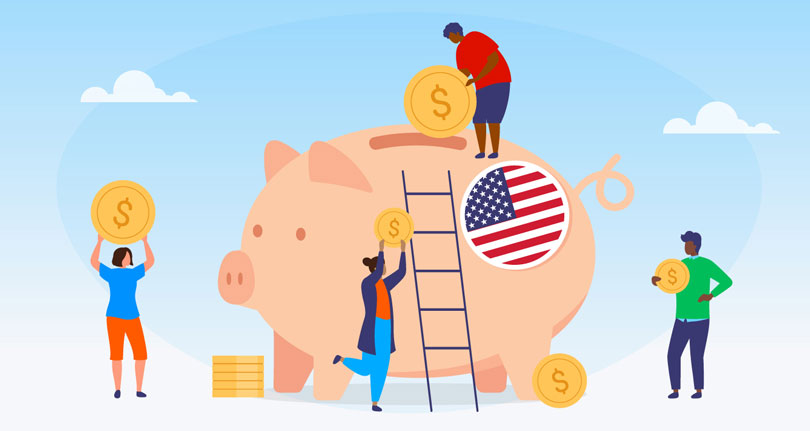Money Dreams: Four In Five Americans Have Lost Sleep Due to Money Worries

Those who sleep better will have quicker responses and concentrate better [1] Brain Basics: Understanding Sleep https://www.ninds.nih.gov/health-information/public-education/brain-basics/brain-basics-understanding-sleep, allowing them to make better decisions. Good rest could then allow people to make better financial decisions as they can concentrate and review their situation better.
With recent shifts in inflation and the economy, a survey was conducted on behalf of Self Financial to analyze how sleep may be affected by current financial pressures.
Key findings
- Seven in ten (70%) claim they feel worse about their finances than ever before.
- Nearly four fifths (79.1%) admit they have had trouble sleeping in the past month over financial concerns.
- Nearly one in five (18.7%) claim that money concerns have left them with between 8 and 10 nights where sleep was impacted by worry or stress.
- Over two thirds (67.2%) of respondents sometimes look at bills or bank statements or watch financial news an hour before sleeping, with a further 19.9% claiming they do this ‘very often’.
- Those in the salary bracket of $70-$80k ($10k-$20k higher than the national average 2023 salary [2] Average Salary By State In 2023 https://www.forbes.com/advisor/business/average-salary-by-state/#:~:text=Average%20annual%20salary%20nationwide%3A%20%2459%2C428,Average%20hourly%20rate%20nationwide%3A%20%2428.34.) were most likely to lose sleep over money.
- 42.3% of respondents use social media channels, including YouTube, Reddit, Facebook and X (formerly Twitter), as their main platform for financial news.
- Healthcare costs were found to be the biggest worry for Americans losing lack of sleep.
- Nearly a third (31.3%) have admitted to canceling or changing vacation plans as a result of the cost of living, with a similar level (31.1%) making an active effort to reduce energy costs.
How finances are affecting sleep
U.S adults are feeling worse about their finances than ever before
Seven in ten (70%) respondents claim they feel worse about their finances than ever before. One in ten (11%) were unsure and just under one in five (18.4%) claim they feel better about their finances than 12 months previously.
Nearly four in five adults have lost sleep over money worries
With many Americans feeling worse about their finances than previous years, it is no surprise that nearly four fifths (79.1%) admit they have had trouble sleeping in the past month over financial concerns.
When asked how often an unsettled night occurs in a recent month, 31.3% have three to five impacted nights of sleep, with a further 22.5% losing between six and seven. One in 20 (5.9%) claim that money concerns have left them with between 11 and 15 unsettled nights sleep.
| Nights struggled to sleep in last month | Percentage of respondents |
|---|---|
| 1 - 2 | 18.4% |
| 3 - 5 | 31.3% |
| 6 - 7 | 22.5% |
| 8 - 10 | 18.7% |
| 11 - 15 | 5.9% |
| 16 - 20 | 2.1% |
| 21 - 25 | 0.7% |
| 26 - 30 | 0.3% |
Financial news, bills, and bank statements may be affecting sleep
The vast majority of respondents admitted to looking at financial news, bills or bank statements within an hour of going to bed, which could play a significant role in disrupting sleep.
Over two thirds (67.2%) of respondents sometimes looked at bills or bank statements, or watched financial news before bed, with a further one in five (19.9%) claiming they do so very often. For 8.2%, it is not a habit they have, as they said they ‘never’ do this, or ‘not usually’.
What do medical experts say about finances and sleep?
Dr. Ryan Sultan spoke to the research team working on behalf of Self Financial about this issue:

“Sleep, often hailed as the cornerstone of mental and physical health, has become a luxury for a significant number of Americans. Recent findings indicate that financial concerns are increasingly robbing individuals of restful nights, shining a spotlight on the intricate web of finances, mental well-being, and societal pressures.”
“This lack of sleep, driven by financial anxieties, has profound repercussions. Chronically disrupted sleep can lead to a host of health issues, from cardiovascular diseases to compromised immune systems.”
“Financial worries have long been a stressor for many, but current data paints a concerning picture. A growing segment of the American population is lying awake at night, ruminating over bills, debts, job security, and future financial stability. These concerns are not limited to any particular demographic; from young adults burdened with student loans to older individuals fretting over retirement, the specter of financial insecurity looms large.
“Several factors contribute to this escalating issue. The changing economic landscape, marked by fluctuations in job markets, rising costs of living, and the shadow of unforeseen global events, has made financial planning increasingly challenging. Moreover, the societal emphasis on material success and the constant exposure to aspirational lifestyles, often via social media, amplifies feelings of inadequacy and financial FOMO (fear of missing out).
“This lack of sleep, driven by financial anxieties, has profound repercussions. Chronically disrupted sleep can lead to a host of health issues, from cardiovascular diseases to compromised immune systems. Furthermore, from a mental health perspective, lack of restful sleep is a significant risk factor for conditions like depression, anxiety, and cognitive decline. The cyclical nature of this problem is evident: financial worries lead to lost sleep, which in turn can impair cognitive functions and decision-making abilities, potentially leading to further financial missteps”.
Those in the salary bracket of $70,000 -$80,000 were most likely to lose sleep over money (84%), followed by $50,000 -$60,000 (82%) and $60,000 -$70,000 (80%). Just over half (54%) of those earning over $100,000 claim to have lost sleep over their finances in the past month.
The percentage of respondents who have lost sleep due to financial worries in the past month, by salary breakdown, is:
| Salary | Percentage of respondents |
|---|---|
| $1- $10,000 | 74% |
| $10,001 - $20,000 | 77% |
| $20,001 - $30,000 | 73% |
| $30,001 - $40,000 | 79% |
| $40,001 - $50,000 | 76% |
| $50,001 - $60,000 | 82% |
| $60,001 - $70,000 | 80% |
| $70,001 - $80,000 | 84% |
| $80,001 - $90,000 | 73% |
| $90,001 - $100,000 | 67% |
| $100,000+ | 54% |
These findings suggest that those with higher incomes have been more affected - this could be due to a number of factors, including higher living costs that have been impacted by interest increases (such as mortgage or car payments).
U.S. adults are losing sleep over healthcare and food costs
With U.S. mortgage rates hitting the highest level since 2002 [3] The 30-Year Fixed-Rate Mortgage Reaches its Highest Level in Over Twenty Years https://freddiemac.gcs-web.com/news-releases/news-release-details/30-year-fixed-rate-mortgage-reaches-its-highest-level-over in the summer of 2023, and the cost of living making day-to-day essentials, such as groceries, much more expensive, the research looked at what costs are the root cause of lost sleep over money.
Healthcare costs were found to be the biggest worry for Americans losing lack of sleep, with over a third (34.4%) admitting they have lost sleep over medical or healthcare costs.
With an estimated 27.6 million Americans (or 8.4% of the population) not having health insurance in place [4] U.S. Uninsured Rate Dropped 18% During Pandemic https://www.cdc.gov/nchs/pressroom/nchs_press_releases/2023/202305.htm#:~:text=Highlights%20from%20the%20report%20include,or%203.7%20 million%20in%202019., it is no surprise that large medical bills may be weighing heavy on the minds of those needing treatment.
The main causes or problems causing sleepless nights over money are:
| Financial concerns keeping people up | Percentage of respondents |
|---|---|
| Healthcare costs | 34.4% |
| Paying for utilities | 34.3% |
| Affording food | 34.1% |
| Paying rent/mortgage | 34.1% |
| Paying off other loans | 33.8% |
| Overall cost of living | 29.6% |
| Owing someone money | 28.2% |
| Having goods repossessed | 27.4% |
| Educational expenses/debt | 22.3% |
| Retirement savings | 10.1% |
Financial news and its impact on American adults
With 67.2% engaging with financial news in the hour before they’re trying to sleep, the survey asked further questions about how they engage with the news and what its impact may be.
Social media is the main source of financial news
When asked how long was spent looking at financial news per week, the research found 27.9% of respondents spent between three to five hours, and a further 21.2% spent between six and seven hours. Shockingly, 2% of respondents (the equivalent of 5.216 million adult Americans) admit to spending no time engaging with financial news. Financial news could relate to inflation, the economy, investments, as well as comparing grocery prices as a few examples.
When asked the main sources of financial information, overwhelmingly most respondents (42.7%) used social media channels, including YouTube, Reddit, Facebook and X (formerly known as Twitter), as their main platform. One in ten (10.3%) use podcasts as their main source of financial news.
| Primary financial news source | Percentage of respondents |
|---|---|
| Social media | 42.7% |
| News publications (online/offline) | 27.2% |
| TV news stations | 18.7% |
| Podcasts | 10.3% |
| Other | 1.1% |
With a NewsGuard report finding that almost 20% of TikTok videos around prominent news topics contain incorrect or misinformation [5] Beware the ‘New Google:’ TikTok’s Search Engine Pumps Toxic Misinformation To Its Young Users https://www.newsguardtech.com/misinformation-monitor/september-2022/, people who use social media as their primary source for financial news and information should ensure that they follow verified and credible sources.
Other more traditional news channels, such as news publications (like WSJ, Financial Times and Forbes) were the primary source of financial news for over a quarter (27.2%) of respondents, with 18.7% claiming TV stations (such as Fox, CBS, ABC) is the main place they see most of their financial news.
Impact of financial news on decision making
Amidst the ongoing news of cost of living, rising interest rates and the homelessness crisis across the country, it seems that many are still focusing on the positives, with just one in six (14.9%) found financial news at the moment to be ‘mostly negative’ and 2.3% as ‘very negative’.
Interestingly, over three quarters (75.3%) state that the news has impacted the financial decisions they have made in the past year, be that good or bad choices.
In fact, those in the very lowest and mid-earnings were most likely to adapt their financial decisions based on the news, with those earning between $70,000 -$80,000 (80%) most likely to adapt their behaviors, along with those earning $10k and below. This dropped to just over two thirds (67%) for those earning between $80,000 and $100,000 and to just over half (54%) for those earning over $100,000.
The percentage of respondents who claim the news has impacted their financial decisions in the last 12 months are:
| Salary | Percentage of respondents |
|---|---|
| $1- $10,000 | 80% |
| $10,001 - $20,000 | 75% |
| $20,001 - $30,000 | 68% |
| $30,001 - $40,000 | 79% |
| $40,001 - $50,000 | 70% |
| $50,001 - $60,000 | 78% |
| $60,001 - $70,000 | 72% |
| $70,001 - $80,000 | 80% |
| $80,001 - $90,000 | 67% |
| $90,001 - $100,000 | 67% |
| $100,000+ | 54% |
Ways to lessen the financial stress burden
The research found that nearly a third (31.3%) have admitted to canceling or changing vacation plans as a result of the cost of living, with a similar level (31.1%) making an active effort to reduce energy costs. Interestingly, 31% of respondents have considered a career change in order to reduce the financial burden of the cost of living crisis.
The most common steps undertaken as a result of the cost of living crisis, according to the research, are:
| Ways Americans are easing financial concerns | Percentage of respondents |
|---|---|
| Canceling or changing vacation plans | 31.3% |
| Reduce energy costs | 31.1% |
| Considering a career change | 31% |
| Looking for more discounts when shopping | 30.8% |
| Selling items you would have otherwise kept | 30.2% |
| Looking at a side hustle | 29.1% |
| Cut grocery costs | 27.6% |
| Canceling subscriptions and memberships | 26.1% |
| Renegotiated loan or debt repayments | 25.1% |
| Doing more DIY | 24.2% |
In terms of alleviating financial stresses that may be affecting sleep, there are lots of things people can do. The research team working on behalf of Self Financial spoke to Dr. Chandler Chang, Clinical Physician and Founder of Therapy Lab who said:
"If money worries are getting in the way of sleep, that could lead to a vicious cycle. Poor sleep and sleep deprivation make it especially difficult to manage anxiety. Insomnia can interfere with the mental skills needed to think creatively and flexibly, and to problem-solve - and those are the very skills you need when you’re in a financial crisis or rough patch.
“Using the time before bed to relax, ideally with a routine or ritual like a hot bath, prepares your mind to rest so you can tackle stressors the next day. You can alleviate pressure by scheduling plenty of time the next day to work on the financial problem. And you can leave a pen and notepad on your bedside table to jot down any reminders or worries for tomorrow. Remind yourself that your rested mind will have much sharper thinking on the topic than your tired mind”.
Sources
- [1] Brain Basics: Understanding Sleep https://www.ninds.nih.gov/health-information/public-education/brain-basics/brain-basics-understanding-sleep
- [2] Average Salary By State In 2023 https://www.forbes.com/advisor/business/average-salary-by-state/#:~:text=Average%20annual%20salary%20nationwide%3A%20%2459%2C428,Average%20hourly%20rate%20nationwide%3A%20%2428.34.
- [3] The 30-Year Fixed-Rate Mortgage Reaches its Highest Level in Over Twenty Years https://freddiemac.gcs-web.com/news-releases/news-release-details/30-year-fixed-rate-mortgage-reaches-its-highest-level-over
- [4] U.S. Uninsured Rate Dropped 18% During Pandemic https://www.cdc.gov/nchs/pressroom/nchs_press_releases/2023/202305.htm#:~:text=Highlights%20from%20the%20report%20include,or%203.7%20 million%20in%202019.
- [5] Beware the ‘New Google:’ TikTok’s Search Engine Pumps Toxic Misinformation To Its Young Users https://www.newsguardtech.com/misinformation-monitor/september-2022/





